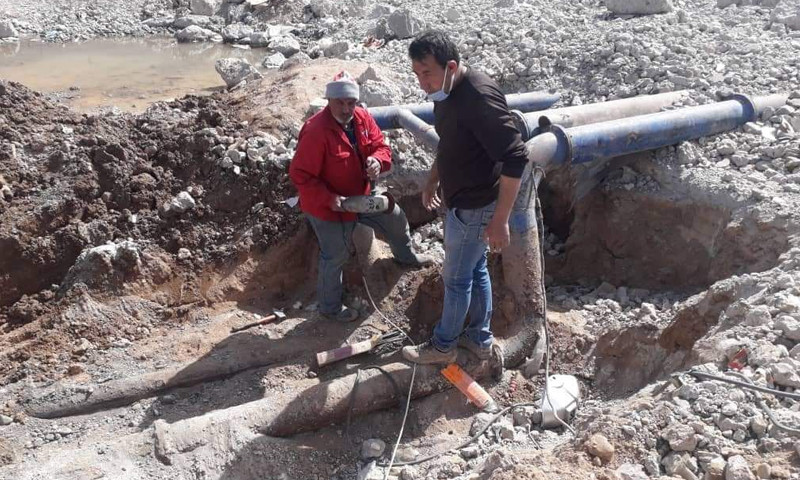Al-Raqqa – Hussam Al-Omar
For over a year, workers in departments of the Autonomous Administration of North and East Syria (NES) have been waiting for approval and implementation of a law guaranteeing their rights in northeastern Syria. However, all they received so far was nothing but promises and rumors.
Aisha al-Hussein, an employee of the NES in her thirties, told Enab Baladi that approving and implementing the Labour Law is a “basic requirement” for all NES employees in all its sectors and levels.
Including al-Hussein, employees interviewed by Enab Baladi confirmed overall discontent with the delay in enforcing the law, despite the continued discussion about developing the organizational, administrative, and legal structures of the NES.
On 2 February 2020, the General Council of the NES ratified the Consolidated Labour Law, setting 90 days for its implementation, which has yet to happen.
The Labor Law regulates the conditions and rules that guarantee workers their rights and protect them from injustice or exploitation. Even though it has been six years since the NES was established, it has not presented a clear copy of the Labour Law.
Labour Law’s articles behind delayed enforcement
The most recent statement made by an official at the NES about the law’s readiness was on 9 December 2020. The co-chair of the Executive Council of the NES, Abdul Hamid al-Mehbash, said that the Labour Law has become administratively and legally ready. In addition, there is an ad hoc committee following up on the effective application of the law, from the beginning of 2021, according to the NES-linked Executive Council’s website.
However, al-Mehbash made a new statement last February to North-Press Agency, a media outlet close to the Kurdish-led NES, that “the enormity of the law” caused its delay, indicating that it contains 137 articles that define the terms, conditions, and principles of appointment and employment, the tasks and duties of workers, their wages, bonuses, and others.
Al-Mehbash added that the NES’s 120,000 employees’ data were collected. Employees were classified into five categories according to their academic qualifications, acknowledging that the “administration” has been criticized for the delay.
A member of the Labour Law Drafting Committee (LDC), who spoke with Enab Baladi on the condition of anonymity, described the delay in implementing the law as an “internal blow” to which the NES is exposed. He added that this put the NES in an embarrassing position before its employees.
In its drafting of the Labour Law of the NES, the LDC relied on several laws enacted by several Middle Eastern countries, such as the UAE, Egypt, Lebanon, and Syria, to end patronizing tendencies and discontent among employees within the NES-linked institutions. The law also takes into account the employees’ competence and efforts, in addition to their diplomas.
A member of the LDC attributed the delay to “the novelty of the Autonomous Administration era,” as it is a new political experience in the region that clashes daily with the political and legal legacies of the institutional systems of the Syrian government.
“Nightmare” of unfair dismissal
Under a decision issued by the head of one of the Raqqa Civil Council’s committees, Omar al-Najm lost his job and is now unemployed, without compensation or protection from the NES.
Omar described unfair dismissal as a “nightmare” that threatens workers’ job stability in the NES-linked institutions, indicating that most of them are forced to go along with their superiors to avoid being fired.
On the other hand, Aisha, an employee of the NES, saw that delaying the application of the workers’ law does not negate the necessity for the NES to adhere to its responsibilities towards its employees, most significantly to redress the poor living conditions of the population, in light of the continuing economic deterioration as a result of the devaluation of the Syrian pound (SYP). The SYP fell to new lows, trading above 4,500 Syrian pounds to the US dollar.
Aisha believes that the anticipated law protects the NES employees from unfair dismissal and improves workers’ living conditions within the NES sectors because the law includes several articles that determine wages and salaries.
The NES increased its employees’ salaries by 150 percent in May 2020, when the exchange rate reached 3,000 SYP to the US dollar. North Press agency quoted an unnamed source saying that the subsequent increase in salaries and wages will be in April, and will range only between 25 and 30 percent.

